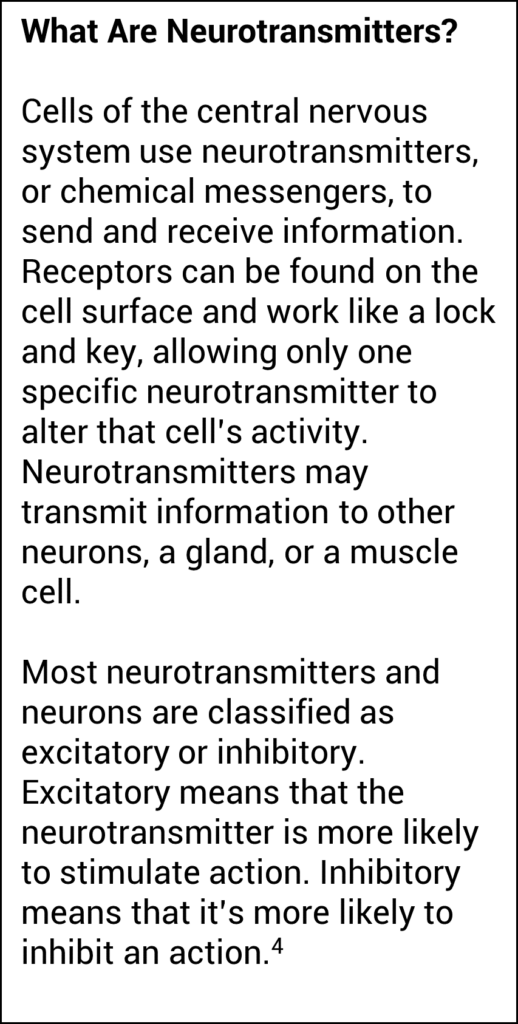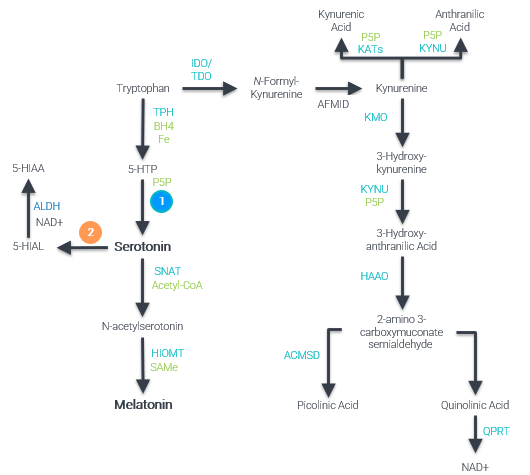 Serotonin is one of our happiness neurotransmitters that makes us feel good. When we are feeling anxious or blue it can be a sign of serotonin imbalance. In addition to mood concerns, serotonin imbalance may also show up as sleep disruptions, gut issues, or cravings and urges; among many other complaints. Because it plays a role in regulating several physiological processes, serotonin testing is helpful to identify serotonin imbalances. Low or high serotonin levels can be corrected with diet and lifestyle.
Serotonin is one of our happiness neurotransmitters that makes us feel good. When we are feeling anxious or blue it can be a sign of serotonin imbalance. In addition to mood concerns, serotonin imbalance may also show up as sleep disruptions, gut issues, or cravings and urges; among many other complaints. Because it plays a role in regulating several physiological processes, serotonin testing is helpful to identify serotonin imbalances. Low or high serotonin levels can be corrected with diet and lifestyle.
What Does Serotonin Do?
Serotonin, like GABA, is an inhibitory neurotransmitter produced primarily in the gastrointestinal tract and central nervous system. As an inhibitory neurotransmitter, serotonin helps to balance the excitatory effects of other neurotransmitters in the body. This balancing effect makes serotonin important for mood and sleep regulation, memory, pain, and many other biological functions.
How Is Serotonin Made in the Body?
Serotonin, like all neurotransmitters, is derived from an amino acid. It is the only neurotransmitter produced from tryptophan and is the end product of the metabolism of tryptophan to 5-hydroxytryptophan (5-HTP). Serotonin is produced in both the central nervous system and the GI tract. Nearly 90% of serotonin originates in the enterochromaffin cells of the small intestine. Platelet serotonin also originates in the small intestine. The remaining serotonin is produced in the brain.1-3

Tryptophan Pathway. Tryptophan is the amino acid precursor for serotonin, melatonin, and niacin. In a series of biochemical steps, tryptophan is converted to 5-hydroxytryptophan (5-HTP) and then to serotonin. Cofactors work with enzymes to synthesize serotonin and break it down. These include tetrahydrobiopterin (BH4), iron, vitamin B6, and niacin.
Enzymes and Cofactors found in Multiple Monoamine Pathways 1) Aromatic L-amino acid decarboxylase (AADC) + Vitamin B6 2) Monoamine oxidase (MAO) + Vitamin B2 Neurotransmitters & Metabolites 5-HTP: 5-Hydroxytryptophan, 5-HIAL: 5-Hydroxyindole-3-Acetaldehyde, 5-HIAA: 5-Hydroxyindole 3-Acetic Acid Enzymes ACMSD: 2-amino 3-carboxymuconate 6-semialdehyde decarboxylase, HAAO: 3-Hydroxyanthranilic acid Dioxygenase, HIOMT: Hydroxyindole-O-methyltransferase, IDO: Indoleamine Dioxygenase, KATs: Kynurenine Aminotransferases, KMO: Kynurenine-3-Monooxygenase, KYNU: Kynureninase, QPRT: Quinolinate Phosphoribosyltransferase, SNAT: Serotonin N-acetyltransferase, TDO: Tryptophan Dioxygenase, TPH: Tryptophan Hydroxylase Cofactors BH4: Tetrahydrobiopterin, Fe: Iron, SAMe: S-adenosylmethionine
What Does Serotonin Do?
Serotonin makes you feel good and plays a significant role in mood regulation. As a mood regulator, having sufficient levels of serotonin helps you feel less anxious, happier, calm, and more focused. In addition to mood regulation, serotonin is also involved in the regulation of several other physiological processes including:
- Aggression5
- Appetite and cravings6
- Calm and relaxation7
- Gastrointestinal motility8
- Learning5
- Menstrual health10
- Mental and emotional health (including mood and anxiousness)5
- Pain perception11
- Sleep12
- Stress response13
- Thermoregulation
What Happens When You Have a Serotonin Imbalance?
Imbalanced serotonin levels are associated with a number of health concerns that impact quality of life. For example:
- Mental and Emotional Health
- Low serotonin levels are often seen with low mood, anxiousness, and stress5
- High serotonin can cause euphoria, but can also lead to feelings of fear, restlessness, and blood pressure imbalances.14
- High serotonin is often seen in cases of low libido.9
- Gastrointestinal Function15
- High serotonin can lead to appetite suppression, whereas increased food cravings might be experienced in the presence of low serotonin.
- Constipation and irritable bowel syndrome have been linked to serotonin imbalances.16
- Sleep-Wake Cycle Regulation
- Fatigue17 and irregular sleep patterns18 are linked to imbalanced serotonin.
- High serotonin may cause sleeplessness at night, followed by fatigue during the day.
What Happens When You Have Too Much Serotonin?
Serotonin syndrome, or the condition of having too much serotonin, usually happens when taking one or more medications that increase serotonin levels. Serotonin syndrome can be life-threatening and should be addressed immediately.
Symptoms of Too Much Serotonin:
- Confusion
- Diarrhea
- Poor blood pressure regulation
- Goose bumps
- Headache
- Increased heart rate
- Nervousness
- Poor muscle control, muscle rigidity, or twitching
- Severe sweating
- Shivering
- Sleep problems
A rare type of cancer called a carcinoid tumor can produce high levels of serotonin in the body and may cause skin flushing, diarrhea, difficulty breathing, rapid heartbeat, or skin lesions on the face.
How Does Serotonin Interact with Other Hormones and Neurotransmitters?
Serotonin works in concert with other hormones and neurotransmitters. Estrogen, testosterone, dehydroepiandrosterone (DHEA), and thyroid hormone enhance serotonin activity. On the other hand, imbalances of cortisol as well as high insulin inhibit serotonin action. Imbalanced serotonin could also be a red flag for imbalanced melatonin levels. Optimized serotonin levels are known to promote healthy thyroid function and activity of the hypothalamus.
Serotonin works together with dopamine to maintain chemical balance in the CNS. They often produce opposite effects in the body to help maintain balance. For example:
- Low dopamine may stimulate hunger, whereas elevated serotonin suppresses hunger.19,20
- Impulsive behavior21 may be linked to elevated dopamine and deficient serotonin levels.
- Dopamine is associated with reward and motivation; serotonin is associated with happiness and mood.22
- Cognition, memory, and attention23 decline when both serotonin and dopamine levels are low.
- Raising serotonin can be suppressive to dopamine, interfering with libido.
How Does Serotonin Become Imbalanced?
A number of factors can disrupt serotonin levels or associated hormones or neurotransmitters. These factors include:
- Digestive issues. Problems digesting food can lead to impaired absorption and breakdown of the precursors and cofactors necessary for building neurotransmitters.24
- Poor diet. A diet lacking in the nutrients needed to make serotonin can affect levels of this neurotransmitter.25
- Stress. Modern levels of stress can cause a cascade of symptoms, including decreased levels of serotonin, oxidative stress, and cortisol imbalances.26
How Can You Identify Serotonin Imbalances?
Testing neurotransmitters is the ideal way to detect serotonin imbalances. NeuroLab® is a premier laboratory for urine serotonin testing, as well as testing for other neurotransmitters and hormones. They use the gold standard in urinary neurotransmitter testing, known as UHPLC Triple Quadrupole Mass Spectrometry (MS). This instrument excels when analyzing neurotransmitters with sensitivity and specificity. It is used at major universities and research facilities around the world.28-32
With a simple and convenient urine neurotransmitter test from NeuroLab®, you can pinpoint serotonin imbalances in patients who struggle with a host of brain health symptoms. Patients can test serotonin levels at home. This makes for easy collection and bypasses the need for a trip to the clinic.
How Can We Naturally Support Serotonin?
It is possible to encourage healthy levels of serotonin through lifestyle measures, including:
- Eating foods rich in the amino acid building block and cofactors needed to make serotonin. Foods rich in tryptophan include eggs, cheese, turkey, nuts, tofu, salmon, and pineapples.25
- Dietary supplements that contain the necessary precursors and cofactors to promote the synthesis, release, and/or function of serotonin can also support healthy levels of serotonin. These include:
- L-tryptophan
- 5-hydroxytryptophan
- Vitamin B6 (as pyridoxal-5-phosphate)
- Iron
- Exercise, even at moderate levels a few times a week, can increase serotonin levels while also improving stress, mood, and cognition.33
- Meditation has been shown to increase serotonin levels, while also reducing stress and anxiousness.34 Additionally, meditation may also aid in improving other indicators of serotonin imbalance such as cognition and memory.
References
- De Vadder F, Grasset E, et al. Proc Natl Acad Sci U S A. 2018;115(25):6458-6463.
- Chen Z, Luo J, et al. Immunity. 2021;54(1):151-163.e156.
- Shah PA, Park CJ, et al. Cellular and molecular gastroenterology and hepatology. 2021;12(3):1093-1104.
- Ranjbar-Slamloo Y, Fazlali Z. Front Mol Neurosci. 2019;12:334.
- Longone P, di Michele F, et al. Frontiers in endocrinology. 2011;2:55.
- Wurtman J, Wurtman R. Curr Obes Rep. 2018;7(1):1-5.
- Tauscher J, Bagby RM, et al. The American journal of psychiatry. 2001;158(8):1326-1328.
- Crowell MD. British journal of pharmacology. 2004;141(8):1285-1293.
- Goldstein I, Kim NN, Clayton AH, et al. Mayo Clin Proc. 2017 Jan;92(1):114-128.
- Yonkers KA, O’Brien PM, et al. Lancet. 2008;371(9619):1200-1210.
- Gupta A, Björnsson A, et al. British journal of anaesthesia. 2011;107(2):164-170.
- Bravo R, Matito S, et al. Age (Dordrecht, Netherlands). 2013;35(4):1277-1285.
- Møller SE. Pharmacology & toxicology. 1992;71 Suppl 1:61-71.
- Kloza M, Baranowska-Kuczko M, et al. Postepy higieny i medycyny doswiadczalnej (Online). 2014;68:738-748.
- Yabut JM, Crane JD, et al. Endocr Rev. 2019;40(4):1092-1107.
- Bonetto S, Fagoonee S, et al. Polish archives of internal medicine. 2021;131(7-8):709-715.
- Cordeiro LMS, Rabelo PCR, et al. Braz J Med Biol Res. 2017;50(12):e6432.
- Davies SK, Ang JE, et al. Proc Natl Acad Sci U S A. 2014;111(29):10761-10766.
- Freitas A, Albuquerque G, et al. Annals of nutrition & metabolism. 2018;73(1):19-29.
- Harrold JA, Dovey TM, et al. Neuropharmacology. 2012;63(1):3-17.
- da Cunha-Bang S, Knudsen GM. Biological psychiatry. 2021;90(7):447-457.
- Peters KZ, Cheer JF, et al. Trends Neurosci. 2021;44(6):464-477.
- Logue SF, Gould TJ. Pharmacology, biochemistry, and behavior. 2014;123:45-54.
- Kiela PR, Ghishan FK. Best practice & research Clinical gastroenterology. 2016;30(2):145-159.
- Gostner JM, Geisler S, et al. Neuropsychobiology. 2020;79(1):89-99.
- Belleau EL, Treadway MT, et al. Biological psychiatry. 2019;85(6):443-453.
- Francescangeli J, Karamchandani K, et al. International journal of molecular sciences. 2019;20(9).
- Barthelemy C, Bruneau N, et al. J Autism Dev Disord. 1988;18(4):583-591.
- Llorente AM, Voigt RG, et al. Clin Neuropsychol. 2006;20(1):133-144.
- Nichkova MI, Huisman H, et al. Anal Bioanal Chem. 2012;402(4):1593-1600.
- Grossman F, Potter WZ. Psychiatry Res. 1999;87(1):21-27.
- Linnoila M, Miller TL, et al. Archives of general psychiatry. 1984;41(7):688-692.
- Alghadir AH, Gabr SA, et al. International journal of environmental research and public health. 2020;17(11).
- Mosini AC, Saad M, et al. Revista da Associacao Medica Brasileira (1992). 2019;65(5):706-713.


